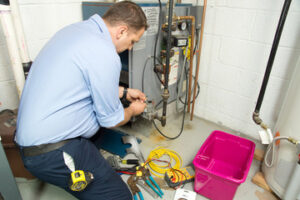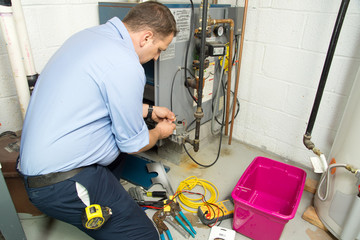Maintaining a furnace is essential for ensuring its efficiency and longevity. Many homeowners overlook the importance of regular furnace maintenance, often waiting until a problem arises before addressing it. However, routine maintenance plays a crucial role in the overall performance of a furnace, helping to prevent costly repairs, improve energy efficiency, and create a more comfortable indoor environment.
When a furnace operates efficiently, it consumes less energy, produces consistent heating, and reduces the risk of breakdowns during peak usage. Understanding the benefits of regular furnace maintenance can help homeowners make informed decisions and keep their heating systems in top condition. Contact Furnace Repair Orillia for professional help.
One of the most significant advantages of regular furnace maintenance is improved energy efficiency. When a furnace is clean and well-maintained, it can operate at peak performance, using less energy to produce the same amount of heat. Over time, dust, dirt, and debris can accumulate in the furnace components, restricting airflow and forcing the system to work harder to maintain the desired temperature. A furnace that has to work harder consumes more energy, leading to higher utility bills and increased wear and tear on the system. By scheduling regular maintenance, homeowners can ensure that the furnace remains clean, lubricated, and properly calibrated, allowing it to operate more efficiently and cost-effectively.
Routine maintenance also helps to prevent unexpected breakdowns and costly repairs. During a maintenance check, a professional technician can inspect the furnace for signs of wear and potential issues, such as loose connections, corroded parts, or clogged filters. Addressing these issues early can prevent them from developing into more serious problems that could lead to system failure. For example, a worn-out blower motor or a malfunctioning thermostat can cause the furnace to stop working, leaving the home without heat during cold weather. Regular maintenance allows technicians to identify and fix these problems before they result in a complete breakdown, reducing the likelihood of expensive emergency repairs and prolonging the lifespan of the furnace.
The longevity of a furnace is directly influenced by how well it is maintained. A furnace that receives regular care and attention can last significantly longer than one that is neglected. Dust and debris accumulation, poor airflow, and lack of lubrication can cause components to wear out prematurely, shortening the lifespan of the furnace. Replacing a furnace can be a significant expense, so extending the life of the existing system through regular maintenance is a cost-effective strategy. Routine maintenance, including cleaning the burners, checking the heat exchanger, and inspecting the ignition system, helps to keep all components in good working order and reduces the need for premature replacement.
Proper maintenance also contributes to consistent heating performance and indoor comfort. When a furnace operates efficiently, it can maintain a consistent temperature throughout the home, providing even and comfortable heat. Poorly maintained furnaces may struggle to keep up with heating demands, resulting in uneven heating and cold spots in certain rooms. Dirty filters, blocked vents, and malfunctioning components can cause fluctuations in temperature and reduced airflow, leading to discomfort and higher energy consumption. Regular maintenance ensures that the furnace delivers steady and reliable heat, improving overall comfort and creating a more pleasant living environment.
Indoor air quality is another important factor affected by furnace maintenance. A clean and well-maintained furnace can help reduce the presence of dust, allergens, and pollutants in the air. When the furnace filter is clogged or dirty, it can no longer effectively capture airborne particles, allowing them to circulate throughout the home. This can lead to increased allergy symptoms, respiratory problems, and overall poor air quality. Replacing or cleaning the filter regularly ensures that the furnace can effectively trap dust, pollen, pet dander, and other allergens, improving the air quality inside the home. Additionally, cleaning the ductwork and ensuring proper ventilation further enhances air quality and reduces the risk of mold growth and other contaminants.
Safety is another critical reason to prioritize regular furnace maintenance. Furnaces that burn fuel to generate heat produce combustion gases such as carbon monoxide, which can be dangerous if not properly vented. A cracked heat exchanger or blocked flue can cause carbon monoxide to leak into the home, posing a serious health risk to occupants. During a maintenance inspection, a technician can check for signs of cracks, leaks, or improper ventilation and address these issues to prevent carbon monoxide poisoning. Ensuring that the furnace is operating safely and efficiently provides peace of mind and protects the health and safety of the household.
Regular maintenance also helps to maintain the efficiency and accuracy of the thermostat. The thermostat controls the temperature settings of the furnace, signaling when to turn on and off based on the desired temperature. A malfunctioning thermostat can cause the furnace to cycle on and off too frequently or not at all, leading to inconsistent heating and higher energy consumption. Calibrating the thermostat during routine maintenance ensures that it accurately reflects the indoor temperature and functions properly, improving overall heating efficiency and comfort.
The efficiency of a furnace is also influenced by the condition of the ductwork. Leaky or poorly insulated ducts can cause heated air to escape before it reaches the intended rooms, reducing overall efficiency and increasing energy costs. During a maintenance check, a technician can inspect the ductwork for leaks, blockages, and poor insulation, making necessary repairs to improve airflow and heating performance. Sealing leaks and insulating ducts help the furnace deliver heat more effectively, reducing energy waste and enhancing overall efficiency.
Lubrication of moving parts is another important aspect of furnace maintenance. Components such as the blower motor and fan require regular lubrication to reduce friction and prevent wear. Without proper lubrication, these parts can become noisy and prone to failure, leading to reduced efficiency and potential breakdowns. A technician can apply appropriate lubricants during maintenance to keep the system running smoothly and quietly, reducing the strain on the furnace and extending its lifespan.
Maintaining the cleanliness of the furnace’s burners and ignition system is essential for optimal performance. Over time, dirt and debris can accumulate on the burners, causing them to burn inefficiently and produce incomplete combustion. This can lead to soot buildup, increased emissions, and reduced heating capacity. Cleaning the burners and checking the ignition system during routine maintenance ensures that the furnace ignites properly and burns fuel efficiently, improving overall heating performance and reducing energy consumption.
The importance of regular furnace maintenance also extends to the electrical components of the system. Loose or corroded wiring, malfunctioning sensors, and faulty controls can all impact the performance of the furnace. A technician can inspect and tighten electrical connections, test sensors, and ensure that all controls are functioning correctly during maintenance. Addressing electrical issues early helps prevent system malfunctions and ensures that the furnace operates safely and efficiently.
Investing in regular furnace maintenance ultimately saves money in the long run. A well-maintained furnace consumes less energy, reducing monthly utility bills. Fewer breakdowns and repairs mean lower maintenance costs, and extending the lifespan of the furnace delays the need for a costly replacement. Additionally, improved energy efficiency and consistent heating performance create a more comfortable living environment, enhancing overall satisfaction with the heating system.
In conclusion, regular furnace maintenance is essential for improving energy efficiency, preventing breakdowns, extending the lifespan of the system, and maintaining indoor comfort and air quality. Routine inspections and cleaning help keep all components in good working order, reducing energy consumption and minimizing repair costs. Proper maintenance also ensures that the furnace operates safely, preventing the risk of carbon monoxide leaks and other hazards. By investing in regular maintenance, homeowners can enjoy consistent and reliable heating, lower energy costs, and a more comfortable and healthy indoor environment.
